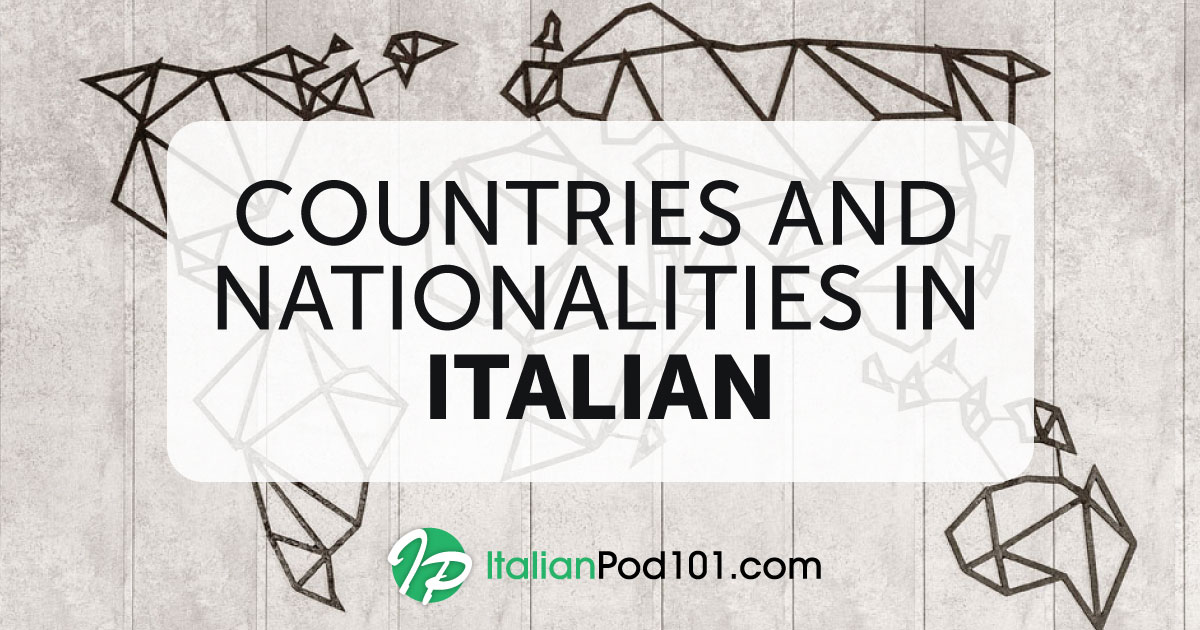
When you’re meeting someone for the first time or joining a new group, it’s normal to worry about what you’re going to say. While one can argue that the entirety of a conversation is important, there are two key elements that are crucial to making a good impression: the beginning and the end. Lucky for you, we’ve already written a great article about how to say hello in Italian—and today, we’ll show you how to say goodbye in Italian, too!
If you’ve been keeping up with our blog, you’ve probably been practicing how to greet people, introduce yourself, exchange pleasantries, and talk about the weather. But what do you say when it’s time to leave?
There are many ways to give an Italian goodbye, each suited to a specific context. In this article, we’ll do our best to cover all of them! Start with a bonus, and download the Must-Know Beginner Vocabulary PDF for FREE!(Logged-In Member Only)
 Table of Contents
Table of Contents
- The 2 Most Common Ways to Say Goodbye in Italian
- Other Ways to Say Goodbye in Italian
- Conclusions and Arrivederci!
1. The 2 Most Common Ways to Say Goodbye in Italian
In Italian, there are two very common ways to say goodbye. In fact, they may be two of the most widely known Italian words (setting aside words such as pizza, lasagna, and espresso…).

“Bye” in Italian is Ciao or Arrivederci.
Have you already guessed what they are? Of course you have…
1. Arrivederci
Arrivederci is literally “to see each other again.” Its formal version is arrivederla, where we substitute the informal personal pronoun ci (“us,” “one another”) with the formal third person pronoun la (“you,” formal).
Arrivederci is the perfect goodbye expression because it works as either a formal or informal farewell, and it can be used to address a single person or a group.
2. Ciao
This is another versatile form of greeting, as it can actually be used for both arrival and departure. Italian students often find this a little confusing at first because there are very few languages where this happens. Most languages have different formulas for one’s arrival and departure. I, personally, can’t think of any other language that has a formula that works for both hello and goodbye, can you? If you do, please leave us a comment below; we’re eager to learn new things about languages!
Nowadays, ciao is commonly used in many languages around the world (mostly to mean “goodbye” and not “hello”), often with a different spelling. But do you know where this word comes from? (To summarize, it comes from Venetian and it meant: “I’m at your service.”)
Ciao is an informal Italian word for “bye,” so you can use it with friends, family, young people, and in other informal contexts. Nowadays, addressing people informally is becoming more and more common, even in professional settings; this is especially true in areas related to the new economy or the world of creativity. And sometimes, you might hear the “doubled-up” form: Ciao, ciao! This usually indicates that someone is going away in a hurry.
2. Other Ways to Say Goodbye in Italian

Don’t worry, there are many more Italian phrases to say goodbye! Here are a few commonly used options and how to use them.
3. Ci vediamo!
Ci vediamo is used less frequently than arrivederci, but it means exactly the same thing (“we’ll see each other again”). So, the emphasis of this phrase is not on the fact that we’re going away, but that we’re going to see each other again. I guess it’s the philosophy of the glass being half-full, right?

Ci vediamo is another way to say Arrivederci.
Now that you’ve seen how arrivederci and ci vediamo literally mean “until we see each other again,” we’ll introduce some other ways to say goodbye in Italian. Some of these phrases indicate when you’ll be seeing each other again, a very useful bit of information to include when you’re departing.
4. A + [Adverb of Time]
Whether you’re leaving a party, heading off to work, or going separate ways after a day out with your Italian friend, you might want to use a goodbye formula like this one:
- A presto. → (“See you soon.”)
- A dopo. → (“See you later.”)
- A fra poco. → (“See you in a little.”)
- A domani. → (“See you tomorrow.”)
- A stasera. → (“See you tonight.”)
5. A + Article + [Generic Date] + Prossimo/a
Let’s say you go running in the park with a friend every Saturday morning, or you see your Italian family only once a year for Christmas. In situations like these, you can say goodbye by saying that you’ll see each other la prossima volta (“next time”). Some common examples are: next week, next year, or next month.
- (Arrivederci) alla settimana prossima. → (“See you next week.”)
- (Arrivederci) al mese prossimo. → (“See you next month.”)
- (Arrivederci) all’anno prossimo. → (“See you next year.”)
Naturally, when you join the preposition a (or most simple prepositions, for that matter) and the article, you get the preposizione articolata—a single word combining the two parts. Do you want to learn more about it? You’ll see and hear these used all the time in Italian…
6. A + [Day of the Week] (+ Prossimo/a)
Now, if you want to be specific as to what day of the week you’ll see each other again, you just need to say a and the day of the week. In this case, you don’t have to worry about the article. However, if you add prossimo at the end, keep in mind that one of the days of the week is feminine and will require the feminine form prossima. Can you guess which day it is? Yes, of course, it’s domenica. (And by the way, adding prossimo/prossima at the end is optional.)
- (Arrivederci) a lunedì (prossimo). → (“See you next Monday.”)
- (Arrivederci) a martedì (prossimo). → (“See you next Tuesday.”)
- (Arrivederci) a mercoledì (prossimo). → (“See you next Wednesday.”)
- (Arrivederci) a giovedì (prossimo). → (“See you next Thursday.”)
- (Arrivederci) a venerdì (prossimo). → (“See you next Friday.”)
- (Arrivederci) a sabato (prossimo). → (“See you next Saturday.”)
- (Arrivederci) a domenica (prossima). → (“See you next Sunday.”)
This is the perfect opportunity to practice the days of the week, isn’t it?
7. Alla Prossima!
This is one of the most versatile Italian goodbye phrases, perfect for any occasion. It’s a generic “to next time,” where you could mean next Monday, next class, next week, next time you do something together, etc.
8. Buon… (“Have a good…”)
Buon (“good”) is a useful adjective in Italian, one that we use in many different contexts. It can mean:
- good to eat → La pizza è buona. (“Pizza is good.”)
- good quality → Ho letto un buon libro. (“I read a good book.”)
- well-behaved → Bambini, state buoni! (“Kids, be quiet.”)
- And much more… I’ve counted fifteen definitions in this dictionary!
Buono is also used to wish someone a good…whatever they’re planning to do next. So, if it’s around Christmas, Easter, New Year, etc., you can use Buon… to wish your interlocutor or group a good one.
- Buon Natale. (“Merry Christmas.”)
- Buona Pasqua. (“Happy Easter.”)
- Buon anno. (“Happy New Year.”)
- Buone vacanze. (“Have a good holiday.”)
- Buon viaggio. (“Have a nice trip.”)

Traveling with style… Buon viaggio!
But unfortunately, not everything in life is fun. You may have to use this formula to bid farewell to people who are working, studying, recovering, or just going about their business.
- Buon lavoro. (“Have a pleasant time at work.”)
- Buona permanenza. (“Have fun staying here.”)
- Buona continuazione. (“Have fun doing this.”)
- Buon riposo. (“Have a good rest.”)
- Buona lezione. (“Have a good class.”)
- Buona guarigione. (“Have a quick recovery.”) There are other formulas that you can use to say goodbye to someone who’s sick (malato/a) or not feeling well (che non si sente bene):
- Riguardati. (“Take care of yourself.”)
- Abbi cura di te. (“Take care of yourself.”)
- Guarisci presto. (“Get well soon.”)
- Stammi bene. (“Be well [for me].”)
And then there are my personal favorites: the Italian goodbye phrases you say when leaving someone or a group of people who are going to do something fun, go on an adventure, or have some great food. (Or even better, all of the above!)
- Buon appetito! (“Enjoy your meal!”)
- Buon divertimento! (“Have fun!”)
- Buona fortuna! (“Good luck!”)
Another way to wish someone good luck is: In bocca al lupo! It literally means “in the mouth of the wolf” and it is the English equivalent of “Break a leg!” Neither expression seems to make sense, but apparently in certain situations (like in the performing arts or before exams) it’s bad luck (sfortuna) to wish good luck!
Ah, and don’t forget: The appropriate reply to the In bocca al lupo farewell is Crepi il lupo! or simply Crepi! (“May [the wolf] die!”). This part isn’t so common anymore, though. In fact, there’s currently a big campaign in Italy to support native wolves, beautiful animals that are coming back to live in our mountains and forests. So now we say: Viva il lupo! (“Long live the wolf!”)

In bocca al lupo! Viva il lupo!
The final typical Italian farewell with buon… is a simple wish to have a good day, evening, or night.
- Buona giornata*! (“Have a good day!”) → You use this formula if there is still lots of daytime left.
- Buona serata*! (“Have a nice evening!”) → You use this formula if you foresee a long evening still ahead.
*Did you notice how this formula uses giornata/serata instead of giorno/notte? This is because these terms better convey the idea of duration, the passing of time. On the other hand, as a greeting when you arrive, you can only use Buon giorno / Buona sera (“Good morning” / “Good evening”).
- Buona notte! (“Good night!”) → This is a typical farewell formula when you (or the person you’re talking to) are going off to bed. There are also other ways to say this:
- Dormi bene! (“Sleep well.”)
- Sogni d’oro! (Literally, “Golden dream” = “Sleep well.”)
A final note on using buon:
1. It has to agree with the noun (masculine, feminine, singular, plural).
2. When it comes before a noun, it changes according to the first letter of that noun. And it works exactly as the indefinite articles un, uno, una, un’.
9. Variations of Arrivederci
We said before that arrivederci literally means “to see each other again.” Well, what if you’re talking on the phone and you’re not actually “seeing” each other? In this case, you can use a similar formula that means “until we hear each other again.” It’s quite a long sentence in English, but in Italian, it’s a simple:
- A risentirci!
And a few variations of this are:
- Fatti sentire. (“Get in touch.”)
- Restiamo in contatto. (“Let’s stay in touch.”)
- Ci sentiamo. (“Let’s hear from one another.”)
- Telefonami. (“Give me a call.”)
And what if you’re bidding farewell and have to leave in a hurry? Unfortunately, this is a situation that’s more and more common nowadays, since we’re all running here and there (di qua e di là) all the time. But, don’t worry, we have a formula for that, too:
- Scusa, devo scappare. (“Sorry, I have to run off.”)
- Devo andare. (“I have to go.”)
- Devo correre. (“I have to run.”)
- Scusa, non ho tempo. (“Sorry, I have no time.”)
10. Addio
Rather appropriately, the final way to say goodbye in Italian is Addio. It’s a rather dramatic way of saying goodbye, because A Dio = To God. So it literally means “We’ll see each other again in front of God.” It’s not used a lot anymore, but there are still a few occasions where it comes in handy: after a tragic breakup, when you bid farewell to someone going to war, or to tell someone that you don’t want to see them ever again (or maybe just in an afterlife…). 😉

Addio… going off to war.
- Addio, domani parto per la guerra. (“Goodbye, tomorrow I’m leaving for the war.”)
- Ti odio! Addio per sempre! (“I hate you! Goodbye forever!”)
- Mi avete scocciato, addio! (“I’ve had it with you, goodbye!”)
3. Conclusions and Arrivederci!
Are you ready to face any Italian conversation and leave with style? In this article, you’ve learned how to say goodbye in Italian formally, informally, before going to sleep, before eating, and even in case you go off to war!
What do you usually say when you leave your Italian friends? Let us know in the comments, and we’ll answer any questions you have.
Keep having fun with Italian and ItalianPod101.com! Don’t forget to check out our website. Here, you’ll find a great selection of resources, such as vocabulary lists, grammar lessons, and even mobile apps!
And by the way, did you know that with our premium service you get access to your own teacher? That’s right! With MyTeacher, you’ll have personalized exercises and one-on-one lessons. So…
Arrivederci!










